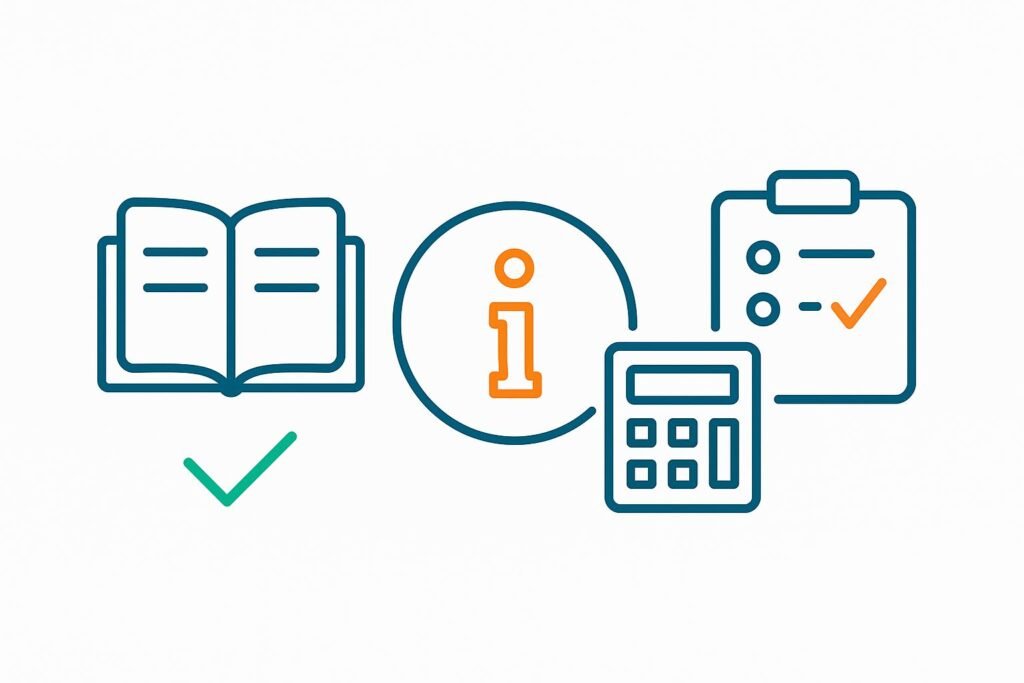
There are three key reasons to stay on top of the money coming in and going out.
HMRC will need accurate figures from you at some point; you need to know if there’s enough cash to keep your business moving each month (cash flow).
And finally, you need to see if you’re actually making a profit.
Bookkeeping might not be the most exciting part of running a business – unless you’re starting up as a bookkeeper or accountant! But staying on top of it is essential.
Being disorganised and putting off paperwork isn’t an option. HMRC can fine you if you’re late submitting information, and the longer you leave it, the more severe the penalty becomes.
This guide brings together everything you need to know to stay in control of your accounts as a sole trader.
Contents
- Why bookkeeping matters
- Basic records to keep
- Daily, weekly, monthly and annual bookkeeping checklist
- Bookkeeping dos and don’ts
- Should you hire an in-house bookkeeper?
- Outsourcing vs DIY bookkeeping
- Final thoughts
Why bookkeeping matters
More than just a legal requirement, good bookkeeping helps you:
- Understand if you’re making a profit or loss
- Keep your cash flow healthy
- Spot financial problems before they become serious
- Prepare for tax deadlines with less stress
Every year, your business accounts will need to be completed. If you’re self-employed, your accounts form the basis of your Self Assessment tax return.
Your bookkeeping records should include all sales, expenses and bank transactions, and the cleaner they are, the easier your tax return will be.
Basic records to keep
Most businesses need to maintain three simple types of financial records:
1. Cash book
This records payments in and out of your bank account. Keep it up to date – over time, it becomes more than a historical record; it can help you forecast future cash flow.
2. Sales invoice file
If you use an accounting package, it will store these for you. If not, file them manually in order.
Keep unpaid invoices at the front to help with credit control. Tools like FreeAgent allow you to scan and store invoices in the cloud, so you won’t lose anything if your laptop crashes.
3. Purchase invoice file
Make notes on how and when invoices were paid (e.g. BACS, cash). File them in order – it’ll save time and accounting costs later.
Daily, weekly, monthly and annual bookkeeping checklist
Daily
- Check your cash position – Make sure you have enough funds to cover upcoming payments.
Weekly
- Prepare and send invoices
- Record all income and expenses
- File receipts and paperwork
- Pay suppliers and avoid late penalties
- Review cash flow for the coming weeks
Monthly
- Chase unpaid invoices
- Reconcile bank statements
- Check turnover and profitability
- Review all outgoing payments
- Make VAT payments (if done monthly)
Quarterly
- Make quarterly VAT payments (if applicable)
Annually
- Keep accurate records to complete your Self Assessment return.
Bookkeeping dos and don’ts
DO
Keep simple records of earnings and expenditure
Whether it’s a spreadsheet or a notebook, track income and expenses in separate columns. Use categories (e.g. travel, materials, phone) to make things easier for your accountant.
Get into the habit
Set aside time each week or month to do your books. It doesn’t matter when – just make it a habit.
Keep all your paperwork safe
Receipts in drawers or coat pockets won’t help you at tax time. Keep a folder (physical or digital), and back everything up. Keep personal and business records separate.
Remember: children and jam don’t mix well with invoices.
Give each invoice a unique number
Start at any number you like – just stick to a logical sequence, and keep a note of the system.
Keep petty cash receipts
Even small spends need to be logged. It all adds up.
Monitor your turnover
If your taxable turnover exceeds £90,000 in the last 12 months – or you expect it to – you must register for VAT. See our guide to registering for VAT.
Use cloud accounting software
Tools like Xero or FreeAgent let you send invoices, reconcile transactions, and track VAT – all in one place.
Here’s how to choose the best software for your business. Most offer a free trial, and Bytestart readers can get a FreeAgent discount.
Hire a professional bookkeeper
If you’re spending hours on your books, it might be worth outsourcing. A good bookkeeper can reduce your accountancy fees – and free you up to focus on earning.
Find one via personal recommendation or the Institute of Certified Bookkeepers.
DON’T
Make your paperwork confusing
Avoid skipping invoice numbers or inflating figures to ‘look bigger’. Keep everything clear and consistent.
Fall behind
Receipts pile up fast. Staying on top of things avoids errors and tax deadline stress.
Mix personal and business expenses
Use separate bank accounts. If you accidentally pay for something with your personal card, reimburse yourself and record it properly.
Throw anything away
Keep records for at least 5 years – ideally 7. See our record retention guide.
Overlook common pitfalls
- Not saving for tax – aim to set aside 20–30% of income
- Missing allowable expenses – these reduce your tax bill
- Relying only on bank statements – especially risky if you handle cash
- Filing late – even if you owe nothing, penalties apply
- Forgetting to split personal/business use – apportion correctly for items like your phone or car
Should you hire an in-house bookkeeper?
Hiring someone full-time to handle your finances has clear advantages – instant support, more personal service, and deep knowledge of your business.
But it’s expensive. Salary, pension, and equipment costs quickly add up. That’s why many small businesses outsource instead.
Outsourcing vs DIY bookkeeping
Many SMEs outsource their accounting to reduce costs and gain flexibility. Digital accountancy firms are often cheaper than traditional ones, and you get access to wider services – from tax and payroll to legal advice.
Alternatively, you could keep bookkeeping in-house and only outsource the complex stuff. This is particularly effective if you use software that your accountant can log into.
And if you’re really trying to save costs, you could train existing staff to handle simple data entry or payroll. Just be careful not to overload them, or introduce errors that cost you more in the long run.
Final thoughts
You don’t need to be an expert to keep basic records. The best approach for most small business owners is:
- Do the simple bookkeeping tasks yourself
- Use cloud software to keep things tidy
- Hire a professional for accounts, tax, and advice
You’ll stay compliant, save money, and sleep better knowing your finances are under control.




